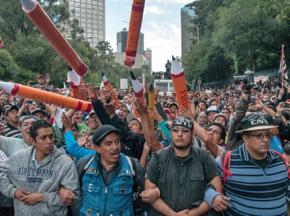Solidarity with the teachers in Mexico
Thousands of Mexican teachers have entered their seventh week on strike against No Child Left Behind-like "reforms" designed to impose high-stakes, standardized tests on students, gut tenure and restrict union rights for teachers.
Teachers from Oaxaca, Guerrero and Michoacan, some of the poorest states in Mexico, have spearheaded the strike, led by a democratic movement called the CNTE--the National Coordinating Committee of Education Workers. They have been joined by teachers striking from Veracruz to Guadalajara--in Mexico City, tens of thousands of teachers and their supporters have occupied public spaces, blocked major highways, and organized marches involving up to 100,000 people.
Although the official leadership of the teachers union, as well as the left-of-center Party of the Democratic Revolution (PRD), have pledged support for President Enrique Peña Nieto's Educational Reform Law and Professional Teaching Law, a minority of teachers have fought successfully to blunt some of the worst aspects of these attacks. Peña Nieto has deployed selective police repression against the teachers, but seems bent on waiting out the strike and driving them back to work, using divide-and-conquer strategies.
All of this takes place in the context of a larger series of neoliberal reforms initiated by Peña Nieto with the strong support of the Obama Administration aimed at deregulating finance, privatizing PEMEX, the national oil company, and opening Mexico for international investors.
As these mobilizations showed, the teachers have won an important moral battle by exposing the aims of the education reforms and have taken important steps towards building relationships with other anti-neo-liberal forces. However, the movement is showing signs of fatigue after so long on strike, and an important debate is currently taking place as to whether to continue the strike to hold out for a complete overturning of the new education law or return to work and continue the fight after having won some small, but important, concessions.
In the statement below, educators in the U.S. offer their support for the teachers struggle--the statement makes no pretense of offering tactical advice and is offered in spirit of solidarity and support for Mexico's democratic teachers' movement and its defense of public education.
SINCE AUGUST 19, tens of thousands of public school teachers in Mexico, led by the CNTE (the National Coordinating Committee of Education Workers), have been on strike against President Enrique Peña Nieto's Education Reform Law and Professional Teaching Law. These "reforms" mandate high-stakes standardized testing (like the Program for International Student Assessment, or PISA) and tie teacher evaluations and job security to test results.
All this in the context of budget cuts and austerity linked to the same Great Recession that both our countries have suffered. As bad as it's been here, we recognize that our brothers and sisters in Mexico have had it even worse. According the Mexican government's own statistics, more than 45 percent of the population lives in poverty, defined as earning $183 per month. Meanwhile, Mexico has 2,540 multimillionaires, including 16 billionaires. Together, these people control $736 billion, meaning that 1.2 percent of the Mexican population controls 43 percent of the country's wealth.

This sounds very familiar to teachers, students and parents in the United States. The 1 Percenters make out like bandits while teachers, parents and students, who make up the 99 Percent, are blamed for the problems confronting public education.
Here in the United States, economic inequality and the politicians' drive to scapegoat teachers has met resistance.
For example, the Chicago Teachers Union won its strike in September 2012 by putting forward a vision of the Schools Our Students Deserve and mobilizing student and teacher support. And just this spring, Seattle Education Association union teachers at Garfield High School led a successful citywide boycott of the Measures of Academic Progress (MAP) test.
Both these struggles received enormous solidarity from teachers, students and parents across the country, and it is in this spirit that we, the undersigned, send our gratitude and solidarity to our brothers and sisters on strike in Mexico. Your fight, like ours, will be a long one and will not end with this round of struggle.
We pledge our support in your fight to defend the dignity of teaching and the right of your students to a quality education. We stand with you against so-called "reforms" that substitute meaningless high-stakes standardized testing for the real changes we need, like higher pay for teachers, more investment in our school grounds and teaching materials, and support for enriching and interesting curriculum that speaks to the incredible variety of our students' ethnic, social and national backgrounds.
As the old labor saying goes, "An Injury to One is an Injury to All!"
Signed (affiliations listed for identification purposes),
Joshua Pechthalt, President, California Federation of Teachers
Trish Gorham, President, Oakland Education Association
Betty Olson-Jones, past President Oakland Education Association
Kei Swensen, Second Vice President, Oakland Education Association
Jesse Hagopian, Seattle Garfield High School, MAP Boycott organizer, named Secondary School Teacher of the Year by Academy of Education Arts and Sciences
Enrique Davalos, chair, Chicana and Chicano Studies Department, San Diego City College
Justin Akers-Chacón, Chicano Studies Professor, City College of San Diego
Dan LaBotz, educator, editor, Mexico Labor News and Analysis
John Green, President, Castro Valley Teachers Association
John Yanno, Brooklyn teacher, chapter leader of United Federation of Teachers, member of Movement of Rank and File Educators
Brian Jones, City University of New York, Graduate Center
Jorge Mújica Murias, immigrant and labor rights activists, Chicago, author of México del Norte blog.
Tom Lewis, Professor and Fellow, Spanish and Portuguese, University of Iowa


